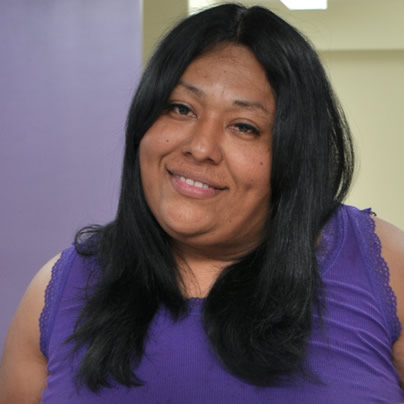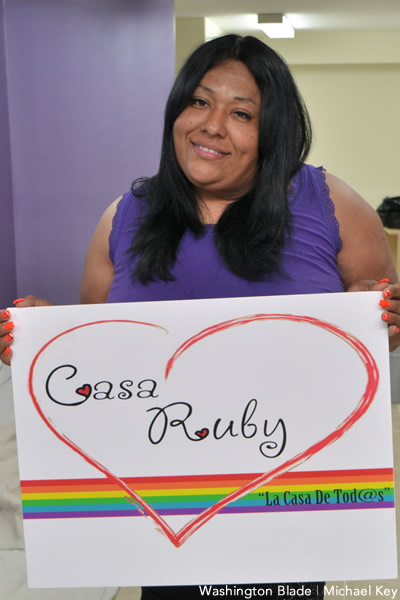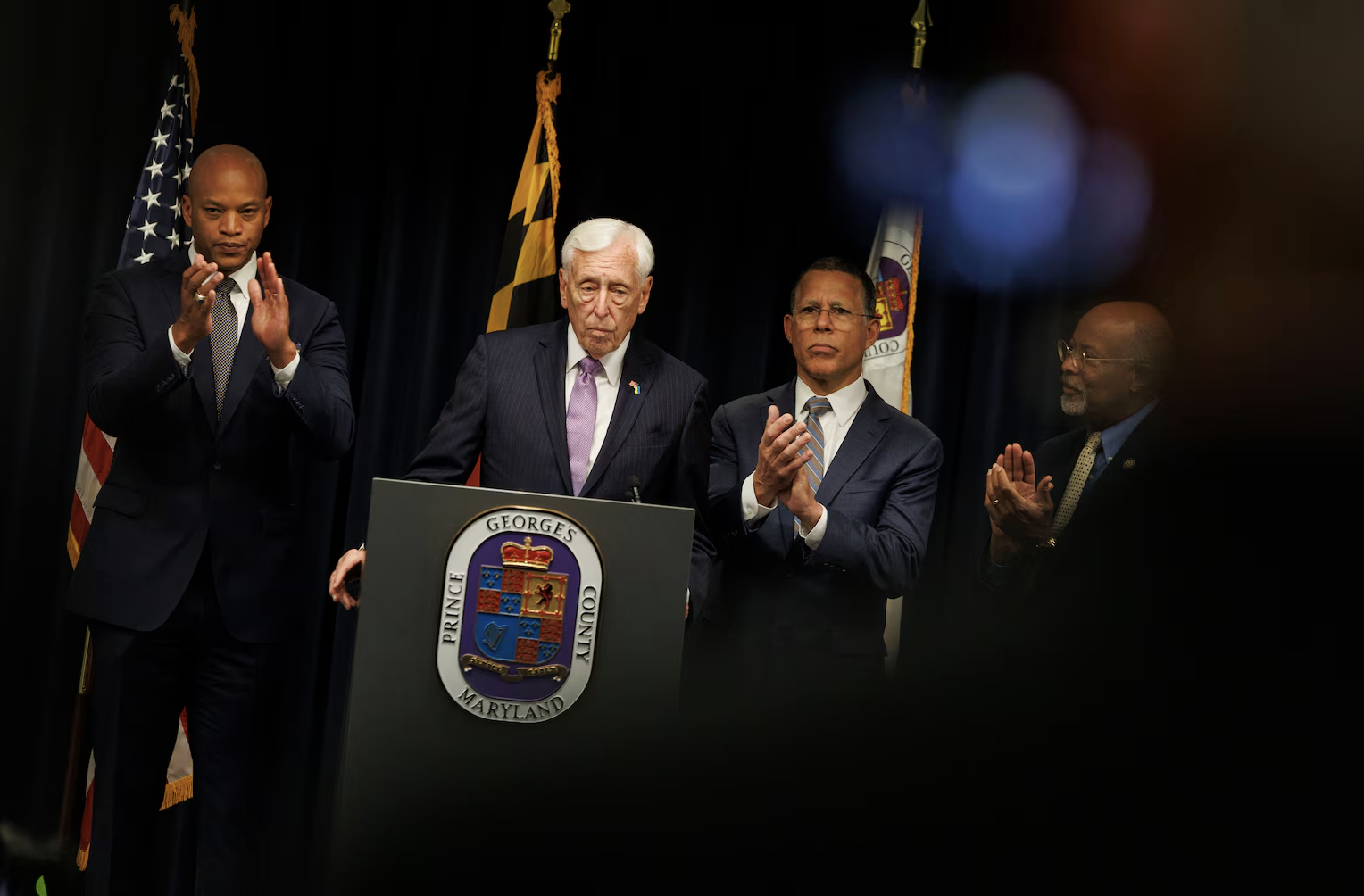Local
Local trans advocate attends El Salvador conference
Corado returns to home country, finds transphobia


Transgender activist Ruby Corado (Washington Blade file photo by Michael Key)
A transgender activist from D.C. is among those who attended El Salvador’s first LGBT rights conference that took place from March 12-17.
Casa Ruby CEO Ruby Corado, who fled the Central American nation in 1986 during the country’s civil war, spoke at a vigil were advocates read the names of 121 LGBT — mostly trans — murder victims during the first day of the conference that took place at Central American University in San Salvador, the country’s capital.
She also visited several LGBT advocacy groups in the capital — one of the organizations had pictures of the bodies of those who had been killed displayed on the wall.
Corado said she experienced homophobia and transphobia herself when she ate lunch with a group of LGBT advocates during the conference. She said the servers in the university cafeteria where they ate took their orders “in a very mean way.” Others called them “maricones” or “faggots.”
Corado said she also received what she described as “that hateful look” on the days she could not “pass” as a woman.
“I always knew that freedom is something we take for granted here,” she told the Washington Blade. “Being gay and being free is something that is totally, totally taken for granted here. Because these people when they choose to be free, they become part of the 121 people that get killed.”
Salvadorian law bans discrimination based on sexual orientation and HIV status, but the U.S. State Department noted in its 2011 Human Rights Report that it remains “widespread.” Anti-trans discrimination and violence in the country remains endemic.
The Salvadorian LGBT rights group Entre Amigos reported to the State Department that police and other public officials continue to engage in “violence and discrimination against sexual minorities.”
Entre Amigos Co-Director William Hernández; Arcoiris Director Mónica Hernández; Dr. Rafael Mazin of the Pan American Health Organization; María Silvia Guillén of the Foundation for the Study of the Application of Law and Cruz Torres of Salvadorian President Mauricio Funes’ cabinet are among those who spoke at the conference the Legal Assistance Office for the Sexual Diversity of El Salvador (ALDES in Spanish) organized.
American University Washington College of Law students Brandon Roman and Arli Christian, who is an intern at Whitman Walker-Health, also attended the gathering.
Aside from participating in the ALDES conference, Corado also visited her father while in El Salvador. She and her two sisters also returned to the home in which she lived and the elementary school she attended.
“I put a lot of closure on that because many of us that come from different countries in a way we are in the perfect situation without persecution,” Corado said as she became emotional about fleeing the country. “You’re just taken away from these places. And all of a sudden you wake up in a different country like I did 27 years ago and you don’t have time to say goodbye.”
Virginia
Gay Va. State Sen. Ebbin resigns for role in Spanberger administration
Veteran lawmaker will step down in February

Alexandria Democrat Adam Ebbin, who has served as an openly gay member of the Virginia Legislature since 2004, announced on Jan. 7 that he is resigning from his seat in the State Senate to take a job in the administration of Gov.-Elect Abigail Spanberger.
Since 2012, Ebbin has been a member of the Virginia Senate for the 39th District representing parts of Alexandria, Arlington, and Fairfax counties. He served in the Virginia House of Delegates representing Alexandria from 2004 to 2012, becoming the state’s first out gay lawmaker.
His announcement says he submitted his resignation from his Senate position effective Feb. 18 to join the Spanberger administration as a senior adviser at the Virginia Cannabis Control Authority.
“I’m grateful to have the benefit of Senator Ebbin’s policy expertise continuing to serve the people of Virginia, and I look forward to working with him to prioritize public safety and public health,” Spanberger said in Ebbin’s announcement statement.
She was referring to the lead role Ebbin has played in the Virginia Legislature’s approval in 2020 of legislation decriminalizing marijuana and the subsequent approval in 2021of a bill legalizing recreational use and possession of marijuana for adults 21 years of age and older. But the Virginia Legislature has yet to pass legislation facilitating the retail sale of marijuana for recreational use and limits sales to purchases at licensed medical marijuana dispensaries.
“I share Governor-elect Spanberger’s goal that adults 21 and over who choose to use cannabis, and those who use it for medical treatment, have access to a well-tested, accurately labeled product, free from contamination,” Ebbin said in his statement. “2026 is the year we will move cannabis sales off the street corner and behind the age-verified counter,” he said.
Maryland
Steny Hoyer, the longest-serving House Democrat, to retire from Congress
Md. congressman served for years in party leadership

By ASSOCIATED PRESS and LISA MASCARO | Rep. Steny Hoyer of Maryland, the longest-serving Democrat in Congress and once a rival to become House speaker, will announce Thursday he is set to retire at the end of his term.
Hoyer, who served for years in party leadership and helped steer Democrats through some of their most significant legislative victories, is set to deliver a House floor speech about his decision, according to a person familiar with the situation and granted anonymity to discuss it.
“Tune in,” Hoyer said on social media. He confirmed his retirement plans in an interview with the Washington Post.
The rest of this article can be found on the Baltimore Banner’s website.
District of Columbia
Kennedy Center renaming triggers backlash
Artists who cancel shows threatened; calls for funding boycott grow

Efforts to rename the Kennedy Center to add President Trump’s name to the D.C. arts institution continue to spark backlash.
A new petition from Qommittee , a national network of drag artists and allies led by survivors of hate crimes, calls on Kennedy Center donors to suspend funding to the center until “artistic independence is restored, and to redirect support to banned or censored artists.”
“While Trump won’t back down, the donors who contribute nearly $100 million annually to the Kennedy Center can afford to take a stand,” the petition reads. “Money talks. When donors fund censorship, they don’t just harm one institution – they tell marginalized communities their stories don’t deserve to be told.”
The petition can be found here.
Meanwhile, a decision by several prominent musicians and jazz performers to cancel their shows at the recently renamed Trump-Kennedy Center in D.C. planned for Christmas Eve and New Year’s Eve has drawn the ire of the Center’s president, Richard Grenell.
Grenell, a gay supporter of President Donald Trump who served as U.S. ambassador to Germany during Trump’s first term as president, was named Kennedy Center president last year by its board of directors that had been appointed by Trump.
Last month the board voted to change the official name of the center from the John F. Kennedy Memorial Center For The Performing Arts to the Donald J. Trump And The John F. Kennedy Memorial Center For The Performing Arts. The revised name has been installed on the outside wall of the center’s building but is not official because any name change would require congressional action.
According to a report by the New York Times, Grenell informed jazz musician Chuck Redd, who cancelled a 2025 Christmas Eve concert that he has hosted at the Kennedy Center for nearly 20 years in response to the name change, that Grenell planned to arrange for the center to file a lawsuit against him for the cancellation.
“Your decision to withdraw at the last moment — explicitly in response to the Center’s recent renaming, which honors President Trump’s extraordinary efforts to save this national treasure — is classic intolerance and very costly to a non-profit arts institution,” the Times quoted Grenell as saying in a letter to Redd.
“This is your official notice that we will seek $1 million in damages from you for this political stunt,” the Times quoted Grenell’s letter as saying.
A spokesperson for the Trump-Kennedy Center did not immediately respond to an inquiry from the Washington Blade asking if the center still planned to file that lawsuit and whether it planned to file suits against some of the other musicians who recently cancelled their performances following the name change.
In a follow-up story published on Dec. 29, the New York Times reported that a prominent jazz ensemble and a New York dance company had canceled performances scheduled to take place on New Year’s Eve at the Kennedy Center.
The Times reported the jazz ensemble called The Cookers did not give a reason for the cancellation in a statement it released, but its drummer, Billy Hart, told the Times the center’s name change “evidently” played a role in the decision to cancel the performance.
Grenell released a statement on Dec. 29 calling these and other performers who cancelled their shows “far left political activists” who he said had been booked by the Kennedy Center’s previous leadership.
“Boycotting the arts to show you support the arts is a form of derangement syndrome,” the Times quoted him as saying in his statement.



















